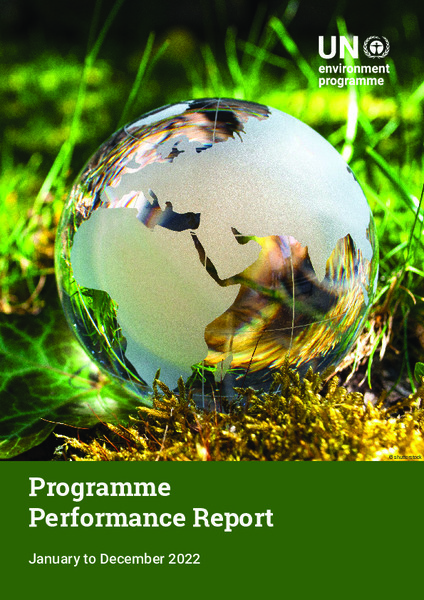| dc.contributor | Policy and Programme Division | en_US |
| dc.contributor.author | United Nations Environment Programme | en_US |
| dc.date.accessioned | 2023-06-06T17:04:05Z | |
| dc.date.available | 2023-06-06T17:04:05Z | |
| dc.date.issued | 2023-06 | |
| dc.identifier.uri | https://wedocs.unep.org/20.500.11822/42645 | |
| dc.description | The 2022 Programme Performance Report reflects UNEP’s work to tackle the triple planetary crisis of climate change, biodiversity and nature loss and pollution. It is a companion to the 2022 UNEP Annual Report. The 2022-2023 Programme of Work (PoW) represents the first half of the 2022-2025 Medium-term Strategy (MTS). In this report, UNEP’s achievements during its first year are presented in greater detail as a set of integrated results. UNEP focused on three interconnected strategic objectives:
• Climate stability,
• Living in harmony with nature, and
• Towards a pollution free planet
Seven sub-programmes contributed to the results under these three strategic objectives. They consist of three thematic sub-programmes: Climate Action, Nature Action and Chemicals and Pollution Action; two foundational sub-programmes: Science-Policy and Environmental Governance; and two enabling sub-programmes: Finance and Economic Transformations and Digital Transformation.
Alongside the programmatic work, the report also highlights performance on organizational effectiveness, efficiency and oversight, reflected in the Policy Making Organs, Executive Direction and Management and Programme Management and Support sections of the PoW.
This report portrays a lean and nimble organisation dedicated to working with diverse partners to address the triple planetary crisis and promote sustainable development. | en_US |
| dc.format | pdf | en_US |
| dc.language | English | en_US |
| dc.rights | Public | en_US |
| dc.subject | pollution | en_US |
| dc.subject | climate change | en_US |
| dc.subject | nature conservation | en_US |
| dc.subject | environmental governance | en_US |
| dc.subject | finance | en_US |
| dc.subject | economic development | en_US |
| dc.subject | digital technology | en_US |
| dc.subject | gender mainstreaming | en_US |
| dc.subject | budget performance | en_US |
| dc.subject | human resource | en_US |
| dc.subject | partnership | en_US |
| dc.subject | pollution control | en_US |
| dc.subject | climate | en_US |
| dc.title | Programme Performance Report January to December 2022 | en_US |
| dc.type | Reports, Books and Booklets | |
| wd.identifier.sdg | SDG 1 - No Poverty | en_US |
| wd.identifier.sdg | SDG 2 - Zero Hunger | en_US |
| wd.identifier.sdg | SDG 3 - Good Health and Well-Being | en_US |
| wd.identifier.sdg | SDG 4 - Quality Education | en_US |
| wd.identifier.sdg | SDG 5 - Gender Equality | en_US |
| wd.identifier.sdg | SDG 6 - Clean Water and Sanitation | en_US |
| wd.identifier.sdg | SDG 7 - Affordable and Clean Energy | en_US |
| wd.identifier.sdg | SDG 8 - Decent Work and Economic Growth | en_US |
| wd.identifier.sdg | SDG 9 - Industry, Innovation and Infrastructure | en_US |
| wd.identifier.sdg | SDG 10 - Reduced Inequalities | en_US |
| wd.identifier.sdg | SDG 11 - Sustainable Cities and Communities | en_US |
| wd.identifier.sdg | SDG 12 - Responsible Consumption and Production | en_US |
| wd.identifier.sdg | SDG 13 - Climate Action | en_US |
| wd.identifier.sdg | SDG 14 - Life below Water | en_US |
| wd.identifier.sdg | SDG 15 - Life on Land | en_US |
| wd.identifier.sdg | SDG 16 - Peace, Justice and Strong Institutions | en_US |
| wd.identifier.sdg | SDG 17 - Partnerships for the Goals | en_US |


